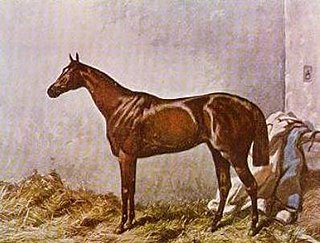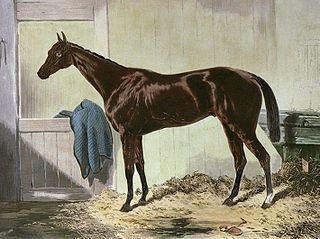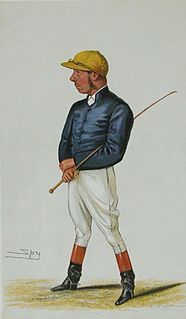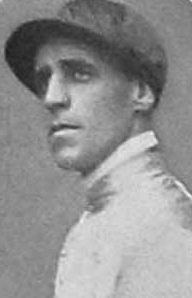
Francis Buckle (1766–1832), also known as Frank Buckle and known to the British horse racing public as "The Governor", was an English jockey, who has been described as "the jockey non-pareil" of the opening quarter of the 19th century, and the man who "brought respectability to race-riding". He won at least 27 British Classic Races during his career, a record which would not be beaten for over 150 years.

Elnathan "Nat" Flatman, born Holton St. Mary, Suffolk, was the first Champion flat racing jockey of Great Britain. He began his thirty-four-year racing career as an apprentice jockey at age fifteen and by 1840 he was the dominant rider in British racing, winning the Champion Jockey title thirteen years in a row. During his career, Flatman won the patronage of many significant owners, including Lord George Bentinck, the Earl of Chesterfield, Admiral Rous, Lord Stradbroke and Lord Derby. For these owners, and others like them he won most of the important Thoroughbred horse races in England, including ten Classics, and some significant races in France. He continued to ride until the paddock accident that incapacitated him and ultimately led to his death at the age of 50.

Hermit (1864–1890), sometimes known, incorrectly as "The Hermit", was a 19th-century British Thoroughbred racehorse and sire. In a racing career which lasted from April 1866 until July 1869 he ran 23 times and won eight races. He was a leading two-year-old in 1866 and won the 1867 Epsom Derby, despite breaking down in training shortly before the race. He continued to race until the age of five, but never recovered his form after running three times in three days at Doncaster in September 1867. After his retirement he had a long and highly successful career at stud.

Blue Gown was a British Thoroughbred racehorse that was the winner of the 1868 Epsom Derby and Ascot Gold Cup. He was one of the best colts of his generation at two, three years and four of age, but his form declined in 1870 after an unsuccessful period in France. He was retired to stud, where he had considerable success as a sire of winners in Germany. Blue Gown died in 1880 while being shipped to the United States.
Geoff Lewis is a Welsh retired jockey who was born in Talgarth, Breconshire.
Robert Robson (c.1765–1838) was a horse trainer, known as the Emperor of Trainers who ran "the outstandingly successful stable of the first quarter of the 19th century."The leading racehorse trainer of his time, he raised their status from glorified groom to professional.

George Fordham (1837–1887) was a British flat racing jockey. He was Champion Jockey every year between 1855 and 1863, as well as four other occasions in his own right and once as joint champion. He then won the Derby in 1879, won the Oaks five times, and the Grand Prix de Paris three times. His career high was 165 wins in 1862. He was described in 1910 as "one of the greatest jockeys of all-time".

Thomas Loates, born in Derby, England, was a three times British flat racing Champion Jockey and one of only seven jockeys to have won more than 200 races in a season in Great Britain. He won the English Triple Crown on Isinglass in 1892, as well as individual Classics on Donovan, Siffleuse and St. Frusquin. On Isinglass, he also won the 1894 Eclipse and 1895 Ascot Gold Cup and he had another top class win on Desmond in Newmarket's July Stakes in 1898.
Charles Maidment (1844–1926) was a British jockey, prominent in the early 1870s.

Joseph Childs (1884–1958) was a French-born, British-based flat racing jockey. He won fifteen British Classics in a 35-year career, the last ten years of which were spent as jockey to King George V. He was known for riding a slow, waiting race, and also for having a short temper which regularly saw him at odds with his trainers and owners.

William Clift (1762–1840), born Wentworth, South Yorkshire, was a British jockey. He won the first runnings of both the 1,000 Guineas and 2,000 Guineas and was the first jockey to win all five of the British Classics.
Ernest Johnson is an Epsom Derby winning British flat racing jockey.

Thomas Goodisson (1782–1840) was a four times Epsom Derby winning British jockey. He was the son of Dick Goodisson, the jockey who won the first three runnings of The Oaks.

Dennis Fitzpatrick (1764–1806) was an Irish, five-times British Classic winning jockey. He was the first Irish professional jockey to ride in England and competed in some of the most notable match races of the 19th century versus fellow jockey Frank Buckle.
Alfred Day was a British classic winning jockey. He won seven classics between 1849 and 1859, including the Derby on Andover, and was nicknamed "King Alfred" for his success.
Robert William Sherwood (1835-1894) was a British jockey and racehorse trainer who won The Derby in both capacities.
Harry or Henry Grimshaw was an English jockey, most famous for winning the British Triple Crown in 1865 on Gladiateur.
John Howe Osborne, also known as John Osborne Jr. was a multiple British classic winning jockey. He was the most successful and most popular jockey in the north of England in the second half of the 19th century. His riding career lasted 46 years.

Thomas French (1844–1873), born in Liverpool, was a Derby winning English jockey.

Frederic E. Webb was a British Classic winning jockey.












